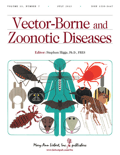
VECTOR-BORNE AND ZOONOTIC DISEASES
Scope & Guideline
Pioneering studies that shape the future of health security.
Introduction
Aims and Scopes
- Epidemiology of Vector-Borne Diseases:
The journal focuses on the distribution, determinants, and dynamics of vector-borne diseases, emphasizing the need for surveillance and public health interventions. - Zoonotic Pathogen Research:
Research on pathogens that can be transmitted from animals to humans is a core area, including studies on their biology, transmission routes, and impact on human health. - Ecological and Environmental Factors:
The journal explores how environmental changes, such as climate change and urbanization, affect vector populations and the spread of zoonotic diseases. - Molecular and Genomic Studies:
Innovative molecular techniques are employed to study the genetic makeup of pathogens, vectors, and their interactions, contributing to improved diagnostics and treatment options. - Public Health Strategies and Interventions:
Research is dedicated to evaluating control measures, vaccination strategies, and public health policies aimed at reducing the incidence of vector-borne and zoonotic diseases. - One Health Approach:
The integration of human, animal, and environmental health perspectives is emphasized to address the complexities of disease transmission and control.
Trending and Emerging
- Impact of Climate Change on Disease Dynamics:
There is a growing interest in how climate change influences the distribution and behavior of vectors, as well as the emergence of new zoonotic diseases. - Genomic Surveillance and Pathogen Evolution:
Research on genomic sequencing and molecular epidemiology is trending, allowing for better tracking of pathogen evolution and resistance patterns. - Emerging and Re-emerging Infectious Diseases:
The journal is increasingly focusing on newly recognized diseases and those that are re-emerging due to factors like globalization and ecological changes. - One Health Initiatives:
There is a notable rise in studies that adopt a One Health perspective, integrating human health, animal health, and environmental factors to combat zoonotic diseases. - Public Health Preparedness and Response:
With the increasing frequency of outbreaks, research aimed at improving public health response strategies and preparedness for vector-borne diseases is on the rise.
Declining or Waning
- Traditional Vector Control Methods:
There has been a noticeable decrease in research specifically focusing on conventional vector control methods, such as chemical spraying, as new integrated approaches gain traction. - Single Pathogen Studies:
The trend has shifted towards studying multiple pathogens and their interactions, leading to a decline in papers focusing solely on individual pathogens. - Historical Epidemiological Studies:
Research that solely documents historical data without contemporary relevance or application appears to be less emphasized, as the focus shifts towards current and predictive epidemiological modeling.
Similar Journals
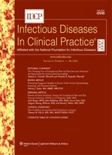
INFECTIOUS DISEASES IN CLINICAL PRACTICE
Bridging research and clinical practice for better health.INFECTIOUS DISEASES IN CLINICAL PRACTICE, published by Lippincott Williams & Wilkins, is a crucial resource in the field of infectious diseases and microbiology. With an ISSN of 1056-9103 and an E-ISSN of 1536-9943, this journal has been a platform for scholarly communication since its inception in 1992, now spanning over two decades of continuous publication. The journal primarily focuses on the latest research developments, case studies, and clinical practices relevant to infectious diseases, making it an indispensable tool for researchers, healthcare professionals, and students alike. Although it is currently categorized in the Q4 quartile for both Infectious Diseases and Medical Microbiology, it continues to strive for excellence and relevance in a rapidly evolving field. By facilitating open access to impactful articles (note: Open Access not applicable), the journal aims to enhance global understanding and management of infectious diseases, ensuring that practitioners are well-equipped to confront contemporary challenges in this critical area of public health. Situated in the United States at TWO COMMERCE SQ, 2001 MARKET ST, PHILADELPHIA, PA 19103, INFECTIOUS DISEASES IN CLINICAL PRACTICE plays an essential role in fostering academic discourse and advancing clinical knowledge.

TROPICAL ANIMAL HEALTH AND PRODUCTION
Advancing animal health in tropical landscapes.Tropical Animal Health and Production is a prominent academic journal dedicated to advancing the field of animal health and production in tropical environments. Published by Springer, this journal has been a pivotal platform for researchers and professionals since its inception in 1969, serving as a vital resource for innovative studies and advancements up to 2024. With impactful research findings, it holds a respectable Q2 ranking in both Animal Science and Zoology, and Food Animals, demonstrating its significance within these fields. The journal’s commitment to high-quality research is further reflected in its Scopus rankings, with a notable position in Agricultural and Biological Sciences and Veterinary Food Animals. Although it is not an open-access publication, the insights and knowledge shared within its pages are invaluable for those engaged in tackling the challenges of animal health and production in the tropics. Researchers and students will find Tropical Animal Health and Production an essential source for the most recent advancements and practices in veterinary science and animal care for food-producing species.
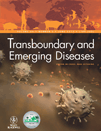
Transboundary and Emerging Diseases
Fostering collaboration in the fight against transboundary diseases.Welcome to Transboundary and Emerging Diseases, a prestigious journal published by WILEY-HINDAWI. With its ISSN of 1865-1674 and E-ISSN of 1865-1682, this journal plays a pivotal role in the dissemination of high-quality research within the fields of Immunology, Microbiology, Medicine, and Veterinary Sciences. Based in the United Kingdom, this open-access journal stands out with a remarkable impact factor, reflecting its category quartiles in 2023, where it secured Q1 rankings across multiple disciplines, including a remarkable rank of #3 out of 194 in Veterinary General, placing it in the top 2% of its field. With coverage spanning from 2008 to 2024, Transboundary and Emerging Diseases provides a vital platform for researchers, professionals, and students to explore emerging threats to global health and animal welfare. The journal's commitment to open access ensures broad availability of cutting-edge research, fostering collaboration and knowledge sharing in pursuit of innovative solutions to transboundary diseases. Join a community dedicated to advancing the science and practice within this crucial area of study.
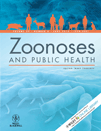
Zoonoses and Public Health
Bridging the gap between zoonotic diseases and public health solutions.Zoonoses and Public Health is a leading peer-reviewed journal published by WILEY, based in Germany. Focused on the intersection of wildlife, domestic animal, and human health, the journal addresses critical issues concerning zoonotic diseases, their impact on public health, and strategies for prevention and control. With an impressive impact factor reflecting its significance, the journal ranks in the Q2 category across multiple fields, including Epidemiology, Public Health, and Infectious Diseases, underscoring its pivotal role in advancing research in these vital areas. As it converges from 2007 to 2024, Zoonoses and Public Health is committed to fostering interdisciplinary collaboration and publishing high-quality research that informs policy and practice. Researchers, professionals, and students alike can access vital insights through its open access options, making it an indispensable resource for anyone invested in understanding and mitigating the effects of zoonoses on public health.

Tropical Medicine and Infectious Disease
Exploring the frontiers of infectious disease research.Tropical Medicine and Infectious Disease, published by MDPI, is a leading peer-reviewed journal dedicated to advancing the field of tropical medicine and infectious diseases. With an open access model established since 2016, this journal fosters a collaborative environment for researchers, professionals, and students from around the world to disseminate cutting-edge findings and innovative approaches to public health challenges, particularly in tropical regions. The journal has earned recognition, achieving a Q2 quartile ranking in notable fields including Immunology and Microbiology, Infectious Diseases, and Public Health, Environmental, and Occupational Health in 2023, indicative of its influence and relevance in the scientific community. With a focus on high-quality research, Tropical Medicine and Infectious Disease aims to bridge the gap between basic science and clinical application, providing invaluable insights critical for combating infectious diseases and improving health outcomes in vulnerable populations. The journal’s accessibility and substantial indexing in major databases further solidify its importance as a key platform for impactful research in this essential field.

EcoHealth
Bridging Ecology and Health for a Sustainable FutureEcoHealth, published by Springer, is a premier academic journal at the intersection of ecology and health, dedicated to advancing our understanding of the interconnections between environmental conditions and human health. Established in 2004, the journal aims to contribute to the rapidly evolving field by publishing innovative research that addresses the complexities of socio-ecological systems. With an impressive impact factor reflecting its standing in the Q2 category for both Ecology and Health, Toxicology, and Mutagenesis, EcoHealth is highly regarded among researchers and practitioners alike. The journal’s inclusion in top-tier Scopus rankings—125th out of 461 in Environmental Science _ Ecology and 77th out of 148 in Environmental Science _ Health, Toxicology and Mutagenesis—further underscores its significance in the scientific community. EcoHealth is committed to facilitating open discussions and interdisciplinary collaboration, making it an essential resource for students, researchers, and professionals seeking to explore the critical linkages between ecological integrity and public health.
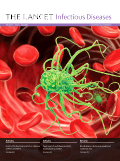
LANCET INFECTIOUS DISEASES
Unraveling Complexities in Infectious Disease ScienceLANCET INFECTIOUS DISEASES is a premier journal published by Elsevier Science Ltd, dedicated to disseminating high-quality research and comprehensive reviews in the field of infectious diseases. Since its inception in 2001, the journal has become a pivotal resource in the medical community, recognized for its rigorous peer-review process and impactful contributions to public health. With an impressive Scopus rank of #2 out of 344 in the category of Medicine - Infectious Diseases, it consistently ranks in the 99th percentile, highlighting its importance and influence in shaping clinical and epidemiological research. The journal's commitment to advancing knowledge in infectious diseases is underscored by its Q1 quartile designation in 2023, affirming its status as a leading academic outlet. Although not an open-access journal, LANCET INFECTIOUS DISEASES provides essential insights for researchers, healthcare professionals, and students, bridging the gap between cutting-edge research and practical application in an increasingly interconnected world.

One Health
Empowering Research for a Unified Health PerspectiveOne Health is a premier open-access journal published by Elsevier, dedicated to advancing the interconnected disciplines of Infectious Diseases and Public Health. Established in 2015, the journal aims to promote holistic approaches to health that consider the interactions between humans, animals, and the environment. With an impressive impact factor and recognition in the top quartiles of both Infectious Diseases and Public Health categories, One Health ranks highly within the Scopus database, showcasing its significant contribution to the field. Situated in the Netherlands, the journal encourages scholarly communication and collaboration, providing a vital platform for researchers, professionals, and students to disseminate their findings and strengthen global health initiatives. By utilizing the open access model, One Health ensures that critical research is freely available, fostering a broader understanding of health-related issues that span multiple sectors.

BMC Veterinary Research
Inspiring collaboration for a healthier future in veterinary care.BMC Veterinary Research, published by BMC in the United Kingdom, stands as a pivotal open-access platform dedicated to advancing the field of veterinary science since its inception in 2005. With an impressive impact factor that reflects its influential presence, this journal has achieved a remarkable ranking of #17 out of 194 in the Scopus Veterinary category, placing it in the 91st percentile among its peers. The journal serves as an essential resource for researchers, professionals, and students alike, fostering the dissemination of high-quality research and innovative practices within the veterinary and broader medical communities. With its commitment to open access, BMC Veterinary Research ensures that valuable insights are accessible to all, promoting collaboration and knowledge sharing that drive the advancement of veterinary sciences. As it continues to publish significant findings until 2024, it remains a key contributor to the contemporary discourse on animal health and welfare.

Journal of Infection in Developing Countries
Advancing global health through infectious disease research.Journal of Infection in Developing Countries, published by J INFECTION DEVELOPING COUNTRIES, is a premier open-access journal dedicated to advancing research in the fields of infectious diseases, microbiology, parasitology, and virology, particularly within the context of developing nations. Established in 2007 and actively disseminating knowledge since 2008, this journal aims to bridge the gap between researchers and practitioners by providing a platform for high-quality, peer-reviewed articles that address the unique challenges faced in these regions. With an ISSN of 1972-2680 and a robust HIndex showcasing its growing influence, JIDC has attained a Q3 category ranking in several disciplines as of 2023, indicating its crucial role in shaping ongoing discourse in public health. As an open-access publication, it ensures that vital research is accessible to all, fostering collaboration and innovation in infectious disease management and control.